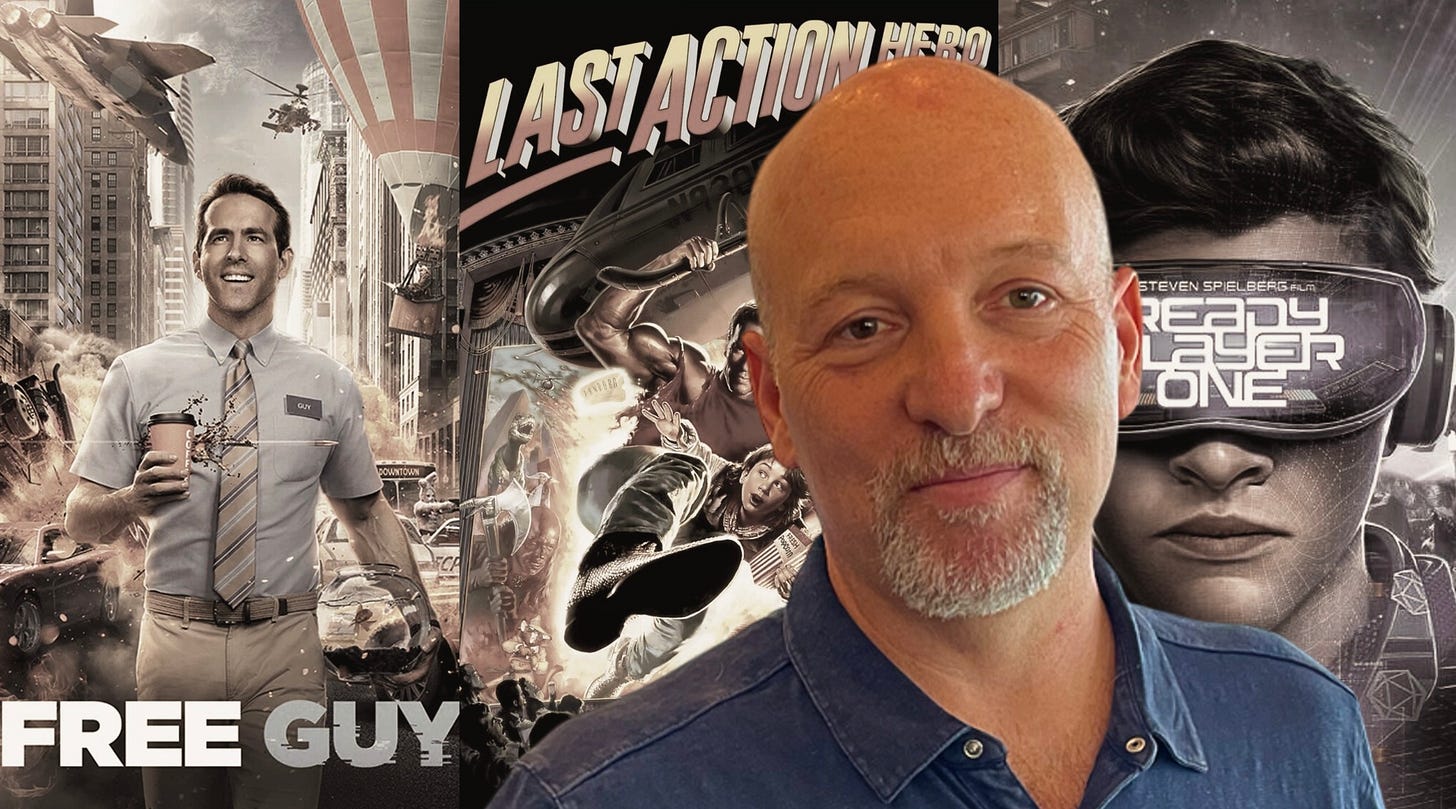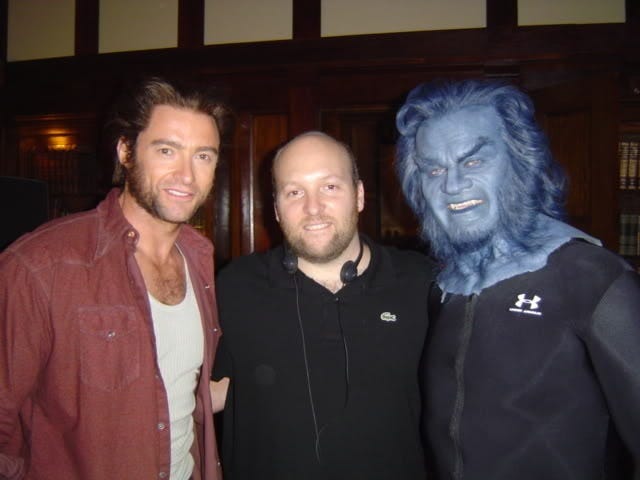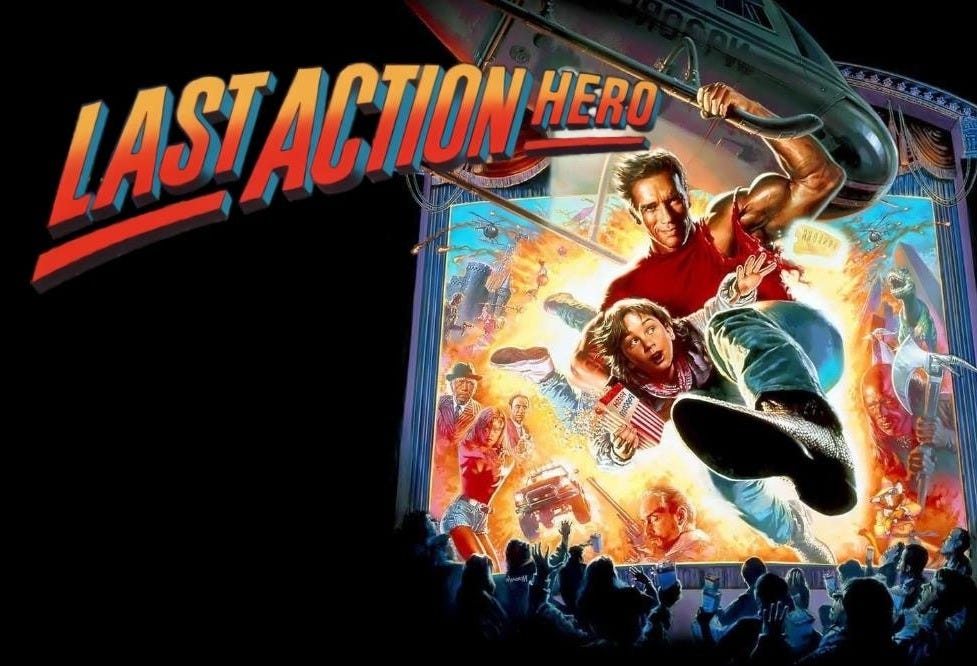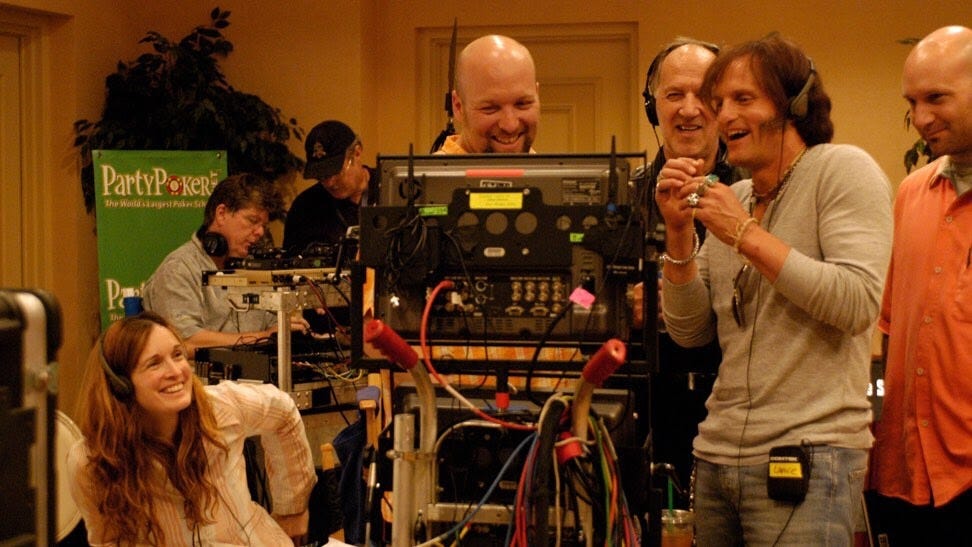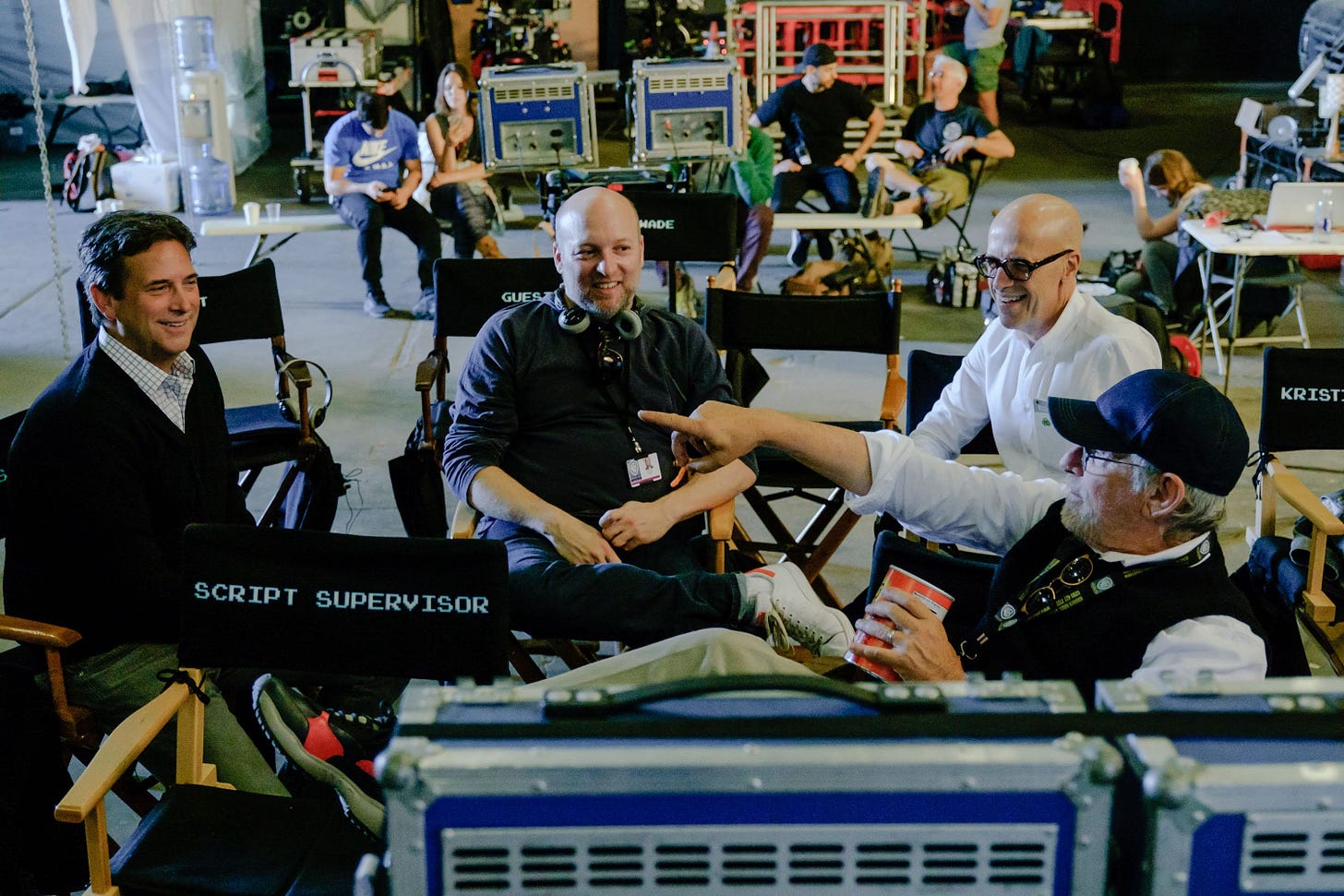Q&A: Screenwriter Zak Penn on the Appeal of Great Ideas
The 'Free Guy' scribe walks us through the highs and many lows of his 30-year career, his hard-earned lessons for surviving Hollywood, and what really excites him about a project today
Two years after I graduated high school, almost all of my friends had either secured themselves blue-collar jobs or were halfway through their university studies. Not me. No, I was at the early end of what would become a nearly decade-long existential crisis — most of it class-fueled — that would see me couch-hop across the United States for months at a time and, in between, sign up for a semester or two of community college classes to remind myself I wasn’t a complete loser yet. It was during one of these classes, something allegedly to do with government, that my anti-establishment professor announced he was going to skip class to go smoke a bong in his car. To keep his students occupied, he was going to put on a film he’d recently discovered that captured everything he thought was wrong about higher education in America. That film was called PCU (1994), and it was co-written by filmmaker Zak Penn — my guest for this week’s artist-on-artist conversation at 5AM StoryTalk.
PCU was a hilarious little film about the absurdities of life on college campuses at the time. While the title ostensibly refers to its setting, Port Chester University, it really stood for Politically Correct University. Years later, when I reached Hollywood myself, I discovered Zak had also written the action-comedy Last Action Hero, a box-office bomb released in 1993; in many ways, it still seems to me like the apotheosis of ’80s actions films. Zak, despite originating the story, inexplicably was reduced to Story By credit. The creative failure of the film — and PCU — had a crushing effect on him, as we’ll discuss. But over the next decade, he took what he learned from the experience, pushed himself to develop a deeper set of skills, and wound up writing a series of wildly diverse films.
By the early part of the 2000s, his name began to appear on Marvel films, first at Fox and then later as part of the MCU — including X2 (2003), Elektra (2005), X-Men: The Last Stand (2006), The Incredible Hulk (2010), and Avengers (2012). There are other credits in there, too — too many to list here, really — but it’s worth noting he has since created two television series (“Alphas” and “Beacon 23”) and written Ready Player One (2018) for Steven Spielberg and the wildly inventive Free Guy (2021) for Shawn Levy.
This might sound like a screenwriter only fixated on action, that PCU was a blip for him, but Zak constantly surprises in terms of what I would describe his more personal projects. In 2004, he directed a wonderfully meta mockumentary called Incident at Loch Ness, starring himself and Werner Herzog as themselves. Three years later, he directed the improv comedy The Grand (2007) and then, in 2014, he helmed a real documentary — Atari: Game Over, about the excavation of a site where some 700,000 game cartridges of the video game E.T. were buried. This is a guy as quick to reference James Cameron as Bertolt Brecht, is my point.
After several months of trading emails in an attempt to set up a date, the two of us finally sat down for a lengthy Zoom to discuss his career and craft. We’d met a couple of times back in 2015, when we were both running for the Writers Guild of America West’s Board of Directors, but we hadn’t spoken since then. I had no idea what to expect, specifically because of the breadth of his work. But I’ll say this, Zak did not disappoint.
What you’re about to read is a sprawling conversation about numerous aspects of the screenwriting trade. Honestly, I can’t imagine anyone other than the most experience screenwriters out there not being able to take something from it. There are several things we cover that had Zak been around in my life 15 years ago, to tell me such things, I might’ve survived several development experiences in much better shape than I did. Because of this, I’ll constantly be pointing out how much something he says makes me feel seen.
I’d encourage you to pay special attention to Zak’s thoughts on surviving crushing career defeats, how to take and execute notes (invaluable tips here), and how he developed the diverse set of creative tools that have allowed him to tackle such a range of stories in both film and TV. His thoughts on character vs. ideas in screenplay development are more philosophical, as is our exchange about the meta role of art in so much of his art, but I’m not sure any of it is any less essential than the rest to begin mulling yourself. I can’t stress enough what an essential read this one is if you ever hope to tell stories for the screen. Enjoy the education!
COLE HADDON: You've written or helped write some monstrously big action films, Zak. And so, I'm curious, is there one action film you religiously return to every year, either because you love it that much for inspiration or because you just need to remind yourself you'll never be as good as that? What's the font from which your passion for this genre flow?
ZAK PENN: Well, first of all, action is hardly a genre because it encompasses so many things. There's sci-fi action. There's action-comedy. People would call Die Hard an action movie, which is also like a disaster movie. So, there's a lot of different genres within it. But I definitely return to Aliens, the sequel. It’s one that I go back to over and over again as an example of kind of perfect action construction in terms of the way [James] Cameron escalates constantly. Just when you think things can't get worse, the nuclear reactor is going to blow up, you know what I mean?
CH: I do. It’s a perfectly structured film.
ZP: Just at every turn, he escalates without sacrificing character. For me, I'd say I bring Aliens up when I'm working on something that's got a lot of action – I bring it up, once a week or something. And that was true of most of Cameron’s films. It's certainly true of T2, as well.
Mad Max: Fury Road is another one that I often talk about, or refer to, because of similar reasons. It’s just perfectly constructed. If you want to talk about, “Oh, I'll never be able to do something as good as this,” you certainly watch that movie and feel like I'll never make a movie that looks quite this good, you know?
CH: It's a question maybe you’d prefer to not answer, but do you feel you've ever approached that?
ZP: I think there are parts of lots of movies I've worked on that approach that. I think Ready Player One does, mostly because of Steven Spielberg and all the people that he brings to the table – but partly because of me, I was part of it.
I think there are some fantastic action scenes in that. I think it really works structurally, and it's easily the most complicated movie I’ve worked on. Even Spielberg says that he thinks it's the most complicated movie he's ever worked on just in terms of all the different plot strands and everything that's going on. So yeah, I feel pretty damn good about that one, I would say.
I worked pretty hard on The Incredible Hulk, too. And that is one where I think the action scenes are really quite good. I don't think the movie as a whole is perfect by any means. But I once had a meeting with Michael Mann and he said, “I watched Incredible Hulk. It's like half a good movie.” Which is, from Michael Mann, an incredible compliment. If he’d told me it was one-fifth a good movie, I'd be happy.
CH: Absolutely.
ZP: But certainly, the most complete, like consistently good action movie that I've written would probably be Ready Player One in terms of the sequences themselves.
I actually think that probably the most underrated action movie I ever wrote is X-Men: The Last Stand. Because I think people hate on that movie for reasons they often can't even articulate other than they have some criticisms of the people involved with making it. But it's actually got some terrific action sequences, and I think the plot is pretty well constructed.
ZP (cont’d): Avengers – obviously there're sequences that we always knew we were going to do, and they're really cool in the movie. I feel like Avengers is probably the most overrated movie I've worked on in that people think it's great, but I'm not sure that it is great. It's certainly good, but I'm not sure that it's as great as people think.
CH: At what point in your career did you become comfortable being so honest about your own work?
ZP: Last Action Hero knocked all the stuffing right out of me. I mean, that was my first script. Once I went to the premiere of that and saw how janky the movie was – like, it's just very disjointed, weirdly edited movie, filled with fart jokes and a bunch of other like things that – I very quickly, right out of the gate, had to start qualifying everything I did by saying like, “Yeah, this isn't what I imagined it would be, but it is what it is.”
[Note to reader: As mentioned earlier, Zak’s credit on the film was reduced to Story By by the time it reached the screen. While it established him as a major new voice, it quickly bombed and became a subject of ridicule by many.]
CH: [Laughs] I’m not alone, then. I had a TV series on the air that I did that from the start with – just apologizing constantly for it – and was chastised by every rep I had at the time. “Don't do that. Take credit for it.” But do I want to take credit for something that feels embarrassing?
ZP: Yeah, well, there's things I've worked on that I think are embarrassing and I don't take credit for them unless I'm responsible. There are a couple of things I've done where I'm responsible for what sucks about it, and I'm totally willing to own up. The idea that you would never make a mistake is very silly.
CH: Can you give me any examples?
ZP: So, I have no problem admitting like Elektra is a movie that gets a lot of criticism that's probably deserved. And it's my fault because I thought I was writing an R-rated movie, and I should have known at that point in my career that of course it wasn't going to be an R-rated movie. The things that would have worked about it as an R-rated movie really don't work without the violence.
CH: I get that.
[Note to reader: Elektra was released as a PG-13 film.]
ZP: You know, so many of the sequences that I think in theory would have been awesome just don't work without the violence that you would need to write a movie about an assassin. I'm a big believer in owning your mistakes, and I think I've written enough things at this point that I don't have a problem doing that.
But I also think for a lot of people don’t want to hear it. Like, Last Action Hero is a good example where there’re a lot of people who love the movie, who grew up on the movie, who are much younger than me – and they don't want to hear me shit on it. But it’s a weird movie.
I think for the most part, most of the things I've worked on, at least they're different, you know? So even when they don't work entirely, at least they're trying to do something different. It's not that many things I've worked on where I just feel like, “Wow, that took no risks, it was really boring and badly done.” I'm not sure I've hit that trifecta.
CH: Staying with Last Action Hero, being the first thing you had produced – well, more or less, it was the first one that hit the screen – how did that feel? I imagine it was an education not getting a screenplay by credit on your own film. And did it – aside from just the emotional impact of that at that moment – did that provide you any amazing lessons that helped take care of you for the next 35 years of your career?
ZP: Sure. Yes, it did because I think if that movie had been a success, who knows?
CH: Explain that.
ZP: I mean, I probably would have thought I was right about everything. When I was 22 and 23, I had the confidence of a 22- and 23-year-old who was pretty sure that he knew better than other people about what should be on screen and what should make a good movie.
I certainly was respectful of the people who had already done great work ahead of me. But I think coming out of the gate, and then just having everything just crumble made me…it pissed me off, which fueled me to do for the next part of my career. It also made me certainly tough. You grow callous each time something like that happens.
So, for it to happen so spectacularly and immediately, it was like, “Okay, well, I'm not giving up now.” When our next movie, PCU, got made and then even after that – ’cause that also a huge box office failure – it just made me feel like, “Well, good, then I have not yet had my moment.”
And I'd have to say that some of the experiences I've had in the past decade or so, in some ways those are harder to bounce back from because you're like, “Oh, I got to work with Steven Spielberg and I didn't get fired. And I got credit, and he took me under his wing, and I have zero to complain about. And so whatever’s going to be as good as that again?” That’s a much harder thing, I think, to wrestle with.
ZP (cont’d): I wish someone had told me it’s always difficult. There's so much luck, right? Like, whenever someone says, “Oh, you must have been really talented to get your first two movies made,” my answer is, “No. Getting your movies made is luck.” I'm not saying there's not some talent involved in selling the movie. There is. And writing something that's good enough to get your representation. But the movies getting made?
CH: Surely your career isn’t based on a modicum of talent and some luck.
ZP: The not-giving-up-part and the staying hungry enough that 35 years later I'm still in the thick of it – that part, I can take some credit for that. Like, when I was disappointed, I would get angry.
CH: Angry in general?
ZP: At the world or at the community. It would materialize in a positive way where I would say, “Damnit, I want another shot. I’ve got to prove to people that they're wrong. That this is not my fault. This isn't the best work that could have been done.” And so, I think that kind of resilience is probably 90 percent of my career – the war of attrition, as you know.
CH: Oh, I know, I know. So, luck is part of it, talent, resilience is key. But I've also heard from people over the years that you know how to make producers happy. You understand the language. And that's something I struggled with in the first five years of my career. I think I probably spoke Producer and Studio very poorly for a long time. Did that come naturally for you, to navigate that system, or did that come from surviving Last Action Hero? I'm not even sure if I’m articulating this well, but lasting this long – lasting 35 years, as many credits as you have – that doesn't come from being the difficult person who pisses people off.
[Note to reader: It’s worth observing here that Zak’s expression changed notably on our Zoom — one might even say dubiously — at the suggestion he possessed any special talent or reputation for handling producers and studio executives.]
ZP: Well, I was the difficult person who pissed people off for a really long time. I mean, on all the Fox Marvel movies, I would say – it wasn't all me – but I think I developed a reputation of being someone who would be blunt with people like that.
CH: I want to hear everything — but especially how you learned to not be that person anymore. Knowing how to take notes is one of the most important skills screenwriters need to develop.



